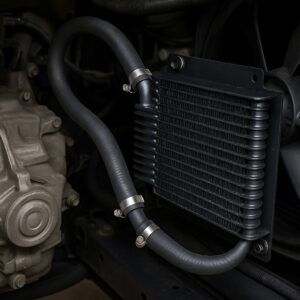When considering the intricate mechanics of your vehicle, the transmission cooling system might not immediately capture your attention. Yet, understanding its critical role can significantly enhance your vehicle’s performance and longevity. Whether you’re looking for Legal assistance for truck accident injuries, this article will explore the nuanced ways in which transmission cooling systems affect fluid longevity, providing a comprehensive understanding of their impact.

Understanding Transmission Cooling Systems
The Role of Transmission Cooling Systems
Transmission cooling systems are critical components that help maintain the longevity and efficiency of your vehicle’s transmission. These systems work by dissipating the heat generated during the transmission’s operation. Excessive heat can cause the degradation of transmission fluid, which is essential for lubrication, cooling, and the smooth operation of the transmission.
Components and Functionality
A typical transmission cooling system consists of a cooling unit, typically an oil cooler, dedicated lines, and, in some cases, a thermostat. The oil cooler acts as a radiator for the transmission fluid. As the fluid circulates through the cooler, heat is extracted, maintaining optimal fluid temperature. In some advanced systems, a thermostat regulates this process, ensuring the fluid does not drop below ideal operational temperatures.
Benefits of Efficient Cooling
Effective transmission cooling systems offer numerous benefits. Besides prolonging fluid life, they prevent overheating, a primary cause of transmission failures. By sustaining a stable temperature, these systems also enhance vehicle performance and reduce maintenance costs. Regular checks and maintenance of the transmission cooling system can further improve its efficiency and reliability, ultimately contributing to a more robust and durable transmission.
How Transmission Cooling Systems Enhance Fluid Longevity
Effective Heat Management
Transmission cooling systems play a vital role in regulating the heat levels within a vehicle’s transmission. By effectively dissipating excess heat, these systems help maintain optimal temperatures. Consistent temperature control is crucial, as elevated heat can degrade the transmission fluid, leading to reduced efficiency and potential system failure.
Prolonging Fluid Life
By mitigating thermal stress, a transmission cooling system ensures that the fluid retains its lubricating properties for an extended period. This enhancement in fluid longevity translates into fewer changes and lower maintenance costs, while preserving the smooth operation of the transmission.
Prevention of Component Wear
A cooler transmission environment prevents premature wear and tear on system components. This protective measure not only extends the lifespan of the transmission fluid but also enhances the overall durability of the vehicle’s transmission system.
Common Issues in Transmission Cooling Systems and How to Address Them
Overheating
Overheating is a prevalent problem in transmission cooling systems. It typically arises from blocked cooler lines or an inefficient radiator. To address this, regularly inspect the system for obstructions, ensuring hoses and coolers are free from clogs. Replacing a failing radiator with a high-performance model can also help maintain optimal temperatures.
Leakage
Transmission fluid leaks can lead to inadequate cooling and fluid levels. Regular checks for fluid puddles under your vehicle and around cooling line connections are crucial. Tighten fittings and replace damaged hoses promptly to prevent further leaks and maintain system integrity.
Inadequate Fluid Flow
Restricted fluid flow due to worn-out components can cause cooling inefficiencies. Perform routine maintenance by replacing aged parts, such as pumps or valves, to sustain smooth fluid circulation, thereby enhancing cooling performance and extending the lifespan of the fluid.
Choosing the Right Transmission Cooling System for Your Needs
Understanding System Types
Selecting the appropriate transmission cooling system involves understanding the different types available. Air-cooled systems are ideal for moderate climates and less strenuous driving conditions. They rely on airflow to dissipate heat and are generally easy to install and maintain. Liquid-cooled systems, on the other hand, provide more efficient cooling by utilizing the engine’s coolant, making them suitable for heavier vehicles or extreme conditions.
Evaluating Your Driving Environment
Consider your driving environment carefully when selecting a cooling system for your vehicle. Suppose you frequently drive in hot climates or navigate through hilly or mountainous areas. In that case, a liquid-cooled system might be more beneficial due to its superior ability to regulate engine temperature under demanding conditions. This system helps prevent overheating by efficiently dissipating heat, thereby enhancing engine performance and longevity. Conversely, if your driving is primarily urban, involving short trips in moderate climate conditions, an air-cooled system could be sufficient. Air-cooled systems tend to be simpler, lighter, and require less maintenance, making them a practical and cost-effective choice for everyday city driving. Additionally, understanding your typical driving patterns and environmental challenges will help you make a more informed decision, ensuring your vehicle operates optimally and reliably in the conditions you face most often.
Budget and Maintenance Considerations
Budget and maintenance are pivotal factors. Air-cooled systems typically have lower initial costs and simpler maintenance, while liquid-cooled systems, though more expensive, often offer enhanced durability and longer fluid longevity. Assess your budget and maintenance capabilities to find a balance that meets your needs and ensures efficient transmission performance.
Final Thoughts
Understanding the intricacies of transmission cooling systems offers valuable insights into how they significantly extend the longevity of the fluid, which is crucial for maintaining vehicle performance. Whether you’re looking for Legal assistance for truck accident injuries, prioritizing regular maintenance, or investing in high-quality cooling solutions, these steps can help you effectively prevent overheating and reduce the risk of costly repairs.